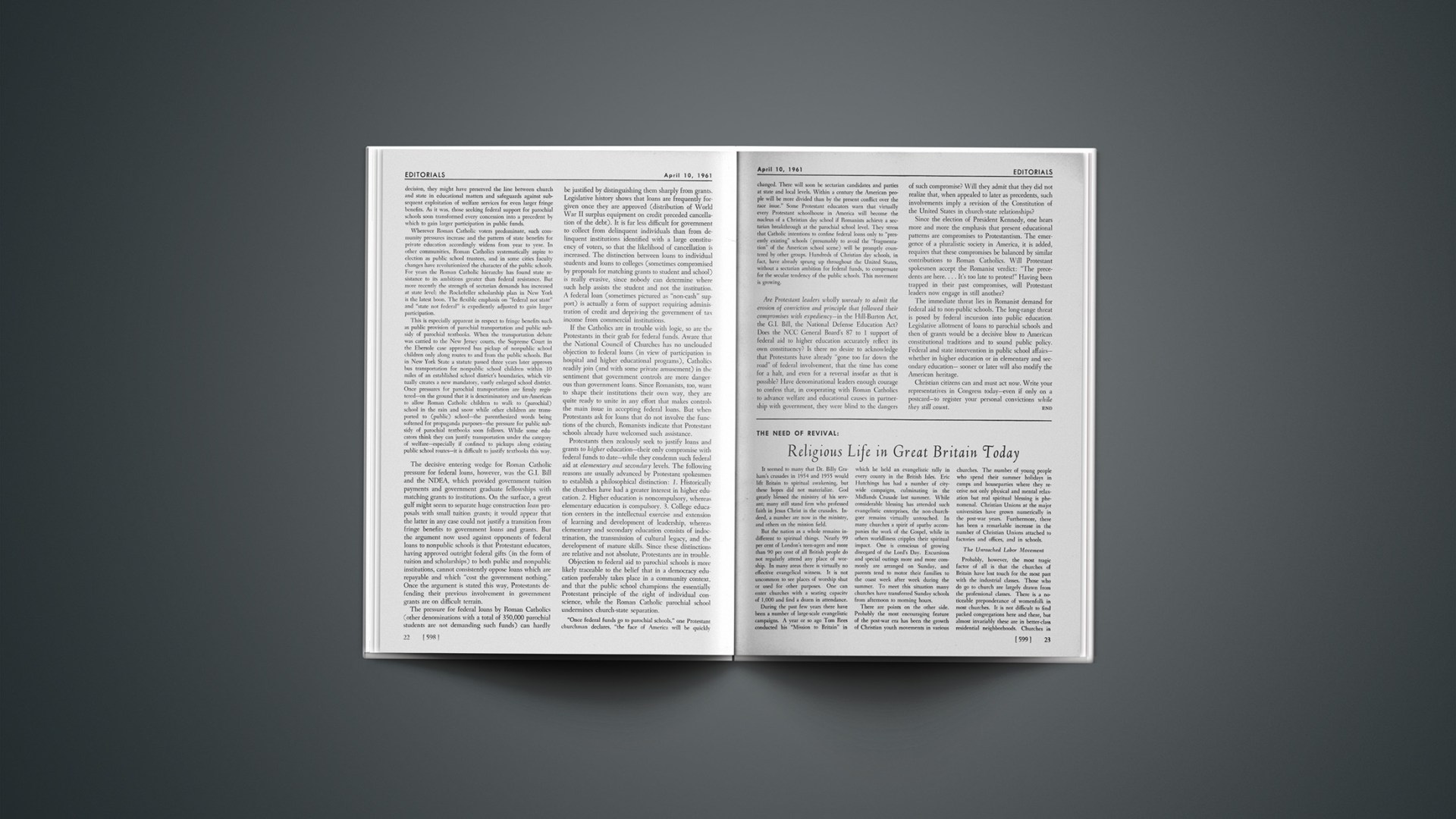It seemed to many that Dr. Billy Graham’s crusades in 1954 and 1955 would lift Britain to spiritual awakening, but these hopes did not materialize. God greatly blessed the ministry of his servant; many still stand firm who professed faith in Jesus Christ in the crusades. Indeed, a number are now in the ministry, and others on the mission field.
But the nation as a whole remains indifferent to spiritual things. Nearly 99 per cent of London’s teen-agers and more than 90 per cent of all British people do not regularly attend any place of worship. In many areas there is virtually no effective evangelical witness. It is not uncommon to see places of worship shut or used for other purposes. One can enter churches with a seating capacity of 1,000 and find a dozen in attendance.
During the past few years there have been a number of large-scale evangelistic campaigns. A year or so ago Tom Rees conducted his “Mission to Britain” in which he held an evangelistic rally in every county in the British Isles. Eric Hutchings has had a number of citywide campaigns, culminating in the Midlands Crusade last summer. While considerable blessing has attended such evangelistic enterprises, the non-churchgoer remains virtually untouched. In many churches a spirit of apathy accompanies the work of the Gospel, while in others worldliness cripples their spiritual impact. One is conscious of growing disregard of the Lord’s Day. Excursions and special outings more and more commonly are arranged on Sunday, and parents tend to motor their families to the coast week after week during the summer. To meet this situation many churches have transferred Sunday schools from afternoon to morning hours.
There are points on the other side. Probably the most encouraging feature of the post-war era has been the growth of Christian youth movements in various churches. The number of young people who spend their summer holidays in camps and houseparties where they receive not only physical and mental relaxation but real spiritual blessing is phenomenal. Christian Unions at the major universities have grown numerically in the post-war years. Furthermore, there has been a remarkable increase in the number of Christian Unions attached to factories and offices, and in schools.
The Unreached Labor Movement
Probably, however, the most tragic factor of all is that the churches of Britain have lost touch for the most part with the industrial classes. Those who do go to church are largely drawn from the professional classes. There is a noticeable preponderance of womenfolk in most churches. It is not difficult to find packed congregations here and there, but almost invariably these are in better-class residential neighborhoods. Churches in the industrial areas are for the most part virtually empty. Probably the only religious group really in touch with the working classes, apart from the Roman Catholics, is the Pentecostal movement. Even the Salvation Army is drawing adherents from a different constituency than that which was previously associated with the Army.
Surveying Denominational Strength
Now, what of the various denominations? Let us consider first the Church of England. Church leaders often boast of the comprehensive nature of the Anglican church, and this communion certainly shelters great contrasts. In recent years both the extreme Anglo-Catholics and the conservative evangelicals have gained in strength. It would be true to say that the evangelical witness in England is very largely found within the national church. Scholarly evangelicals as well as some of the most effective evangelists are in the Church of England. Men are coming forward for the Anglican ministry from half a dozen theological colleges which are committed to the evangelical point of view. Several Church of England missionary societies are solidly evangelical in outlook. Moreover, home missionary societies, such as the Church Pastoral Aid Society and the Church Society, hold the right of appointment to a number of influential parishes in the Church of England. One of the largest congregations in London is found in an evangelical Anglican church, All Souls, Langham Place, whose Rector is the Reverend J. R. W. Stott.
At the annual Keswick Convention, Anglican speakers are much to the fore. In many Christian youth movements Anglican influence is extremely strong. From evangelical Anglicanism a growing number of scholars have risen vigorously to defend the evangelical position. A research center at Oxford has been set up recently to further this objective.
Generally speaking, the more colorless churches of the Anglican communion are the least attended. Many Anglo-Catholic churches have extremely large congregations, as have a number of the evangelical churches. While the old liberalism has largely disappeared in many areas, it has been widely replaced by extreme sacerdotalism.
Now what of the Free Churches? Let us consider first the recognized Free Churches linked in the Free Church Federal Council. The general picture here is far from encouraging. For the most part, Free Church leaders reserve their greatest enthusiasm for the ecumenical movement, and continue to incline towards theological liberalism. By and large, conservative evangelicals in the Free Churches are somewhat frowned upon. At annual congresses and assemblies, lip-service is paid to evangelism but much more time is devoted to discussing the social implications of the Gospel. Even on the social question, the Free Churches find it difficult to speak with one voice. Free Churches on the whole tell of decreasing memberships. The nonconformist conscience, so potent an influence in national life in the nineteenth century, now rarely exerts itself. Almost all the nonconformist colleges are affected in greater or lesser degree by theological liberalism, there being no counterpart among the Free Churches to the conservative evangelical Anglican theological colleges. Despite considerable discussion over the years on the issue of Free Church Union, no real progress has been made, although there is general agreement not to multiply Free Churches on new housing estates.
One encouraging feature in the post-war years has been the emergence of “revival fellowships” in the Baptist, Congregational, and Methodist denominations. Both ministers and laymen in these groups represent not only the solid core of conservative evangelicals within the different denominations, but are pledged to pray regularly for spiritual revival. Recently a similar group has been formed within the Church of England. The different groups unite from time to time for prayer and witness.
A comparatively modern phenomenon is the emergence of the Independent Evangelical Churches, many of which are now linked together in the Fellowship of Independent Evangelical Churches. These are consistently evangelical in outlook, although many of them are numerically weak. The situation is improving somewhat, as a more highly trained ministry finds its way into their ranks. A number of men now serving such churches have had training at the London Bible College. Many of these Free Churches have displaced the “mission halls” of an earlier generation. One might say that the mission hall mentality has largely disappeared in the face of a growing “church consciousness.”
One of the most interesting features of recent years has been the growth of the Pentecostal movement. While still very largely an unknown quantity, it is gradually establishing itself in the country at large. Evangelicals as a whole have been chary of extending the hand of fellowship to Pentecostals, but this situation is now rapidly changing. The largest regular congregation in the Manchester area is a Pentecostal assembly. In some cases, Pentecostalists have reopened Free Churches discarded by the major denominations. The two main groups are known as Elim and Assemblies of God, the difference between them being largely in church government. These two groups with others are linked together in the British Pentecostal Fellowship.
The Society of Friends, popularly known as Quakers, is a very small body these days, and concerns itself almost exclusively with social questions in relation to the Gospel.
It is almost impossible to assess the strength of the Christian (Plymouth) Brethren as no facts and figures are obtainable. But without doubt, upwards of 80,000 people are to be found in Brethren assemblies. All such groups are fundamentalist in doctrine but there are two main divisions, usually termed “open” and “exclusives.” The “open” Brethren are usually very cooperative in local evangelistic efforts, but the “exclusives” maintain a position of isolation. Among the “exclusives” there have been several different “parties,” differing on certain doctrinal matters.
A controversy which is currently the talking point among many evangelical leaders is the Arminian-Calvinist debate. In the last six years or so there has been a definite swing to Calvinism and an increasing interest in the writings of the Puritans. Some leaders who supported Dr. Graham’s campaigns in 1954–1955 now seem reluctant to pledge their support. It is doubtful as to how far this discussion has percolated through to the man in the pew, and the general feeling is that when Dr. Graham comes to Manchester, the weight of evangelicals will be solidly behind him. Many who look askance at the “little Billy Grahams” who have come to the fore in recent years, nevertheless recognize that Dr. Graham is “a man sent from God” who enjoys the divine blessing upon his ministry to a unique extent in these days. Britain desperately needs a spiritual revival. There are encouragements here and there, even if the overall picture is far from rosy. The only really encouraging feature is that evangelicals as a whole have long since lost confidence in methods and techniques and have come to see that such a revival is the only real answer to Britain’s need.
GILBERT W. KIRBY
General Secretary
The Evangelical Alliance
London, England










